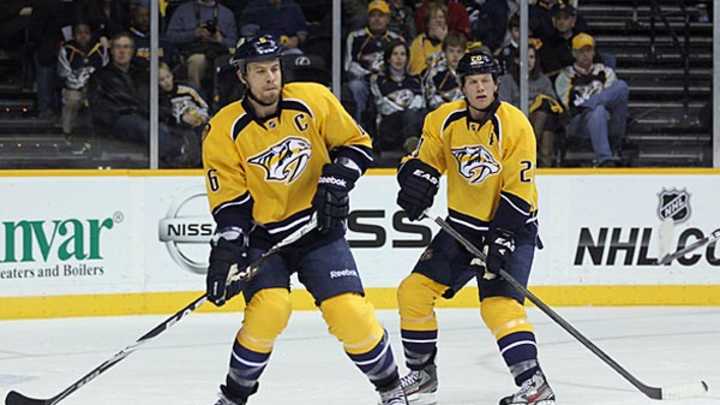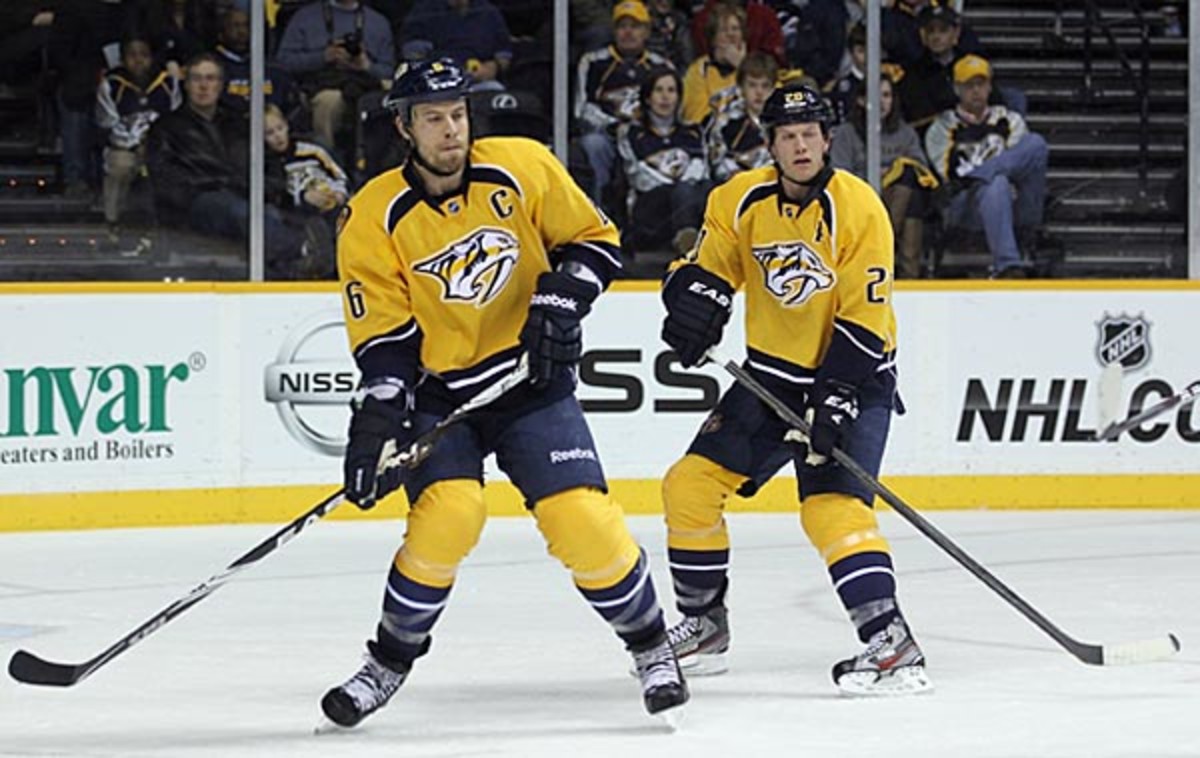Shea Weber's offer sheet puts Predators at the crossroads

It's been a cruel summer in Nashville, where captain Shea Weber (left) may soon follow his former All-Star defense partner Ryan Suter out of town and leave the once-promising Predators in a shambles. (Bruce Bennett/Getty Images)

By Stu Hackel
There have been a few huge bombshells dropped during this offseason and two of the biggest have fallen on Nashville. The Flyers signing restricted free agent defenseman Shea Weber late Wednesday to a mammoth 14-year offer sheet worth a reported $110 million comes two weeks after Ryan Suter, Weber's partner in the NHL's best defensive tandem, signed a 13-year, $98 million deal with Minnesota as an unrestricted free agent. Thanks to the Flyers' offer sheet, a Predators team aiming to join the ranks of the NHL's best is now at a crossroads.
Nashville has seven days to match Philadelphia's offer or Weber will become a Flyer. In return, the Predators would receive a package of up to four Flyers first round draft choices, depending on the details of the contract. It's a steep price, (Sam Carchidi of The Philadelphia Inquirer calls it "reasonable for a player of Weber's stature") but the Flyers need to fill the hole created by Chris Pronger's apparently career-ending concussion issues, and the loss of free agent defenseman Matt Carle. As one of the NHL's wealthiest clubs, Philly certainly has money. Regardless, whichever team ends up with Weber's new contract will have him until the two-time Norris Trophy runner-up is 40 years old.
According to the rules, if the Preds match the Flyers' offer, they cannot trade Weber for one year. Whether they will or can sign him becomes Nashville's biggest offseason challenge, maybe the biggest faced by any club this summer. More on that later.
Signing a player to an RFA offer sheet is rare and always contentious, although it is perfectly legal according to the current collective bargaining agreement. Seven offer sheets have been submitted under the current CBA and six have been matched by the player's club. RFA signings are considered inflationary by league management types because the signing team usually sets a salary level and structures the offer so the player's club will have difficulty matching it. This is thought of as something of a low blow because such offer sheets force the player's team to sign him to a contract that someone else negotiated.
This particular signing will especially anger Nashville GM David Poile, who reportedly was working on trading Weber, talking with the Sharks, Rangers, Red Wings and Flyers about deals. After some supposed deadlines to make a trade came and went with no action, the Flyers decided not to wait any longer, so they gave Weber their offer. All this and more was first reported by TSN's Darren Dreger overnight on his Twitter account (here, here and here) and it tells something of a different story than what Poile was relaying to his local media earlier this week. Poile had told Josh Cooper of The Tenneseean that he'd spoken with Weber's agents on Monday, stating, “Right now my priority is to see Shea signed and hopefully finalize a longer term deal with Shea.”
So there has to be more to this story that we'll learn about over time, and it's possible that Weber's camp and Poile were not seeing eye-to-eye on contract terms and/or that Weber let it be known that he wasn't as enchanted playing in Nashville without Suter. If so, these developments would have forced Poile to simultaneously pursue signing Weber and dealing him so he wouldn't get burned again by a star defenseman. That plan hasn't entirely worked.
UPDATE: Dreger had a different account of the trade situation in a blog post later Thursday, saying trade discussions only began after the Flyers submitted their offer sheet.
What are the chances the Predators will match? The Flyers' offer is heavily frontloaded. A large amount of it is reportedly a signing bonus. Sportsnet's Nick Kypreos tweeted on Thursday morning that the deal calls for Weber to get $1 million in salary and a $13 million bonus in each of his first four years, $4 million in salary and $8 million in bonus payments in each of the next two seasons, $6 million in salary in each of the next four, $3 million in Year 11, and $1 million in each of the deal's last three years. That means Nashville has to fork over $26 million to Weber in bonus payments alone during the next calendar year, plus his extra million in salary. Do the Preds have that sort of cash on hand?
"We have stated previously that, should a team enter into an offer sheet with Shea, our intention would be to match and retain Shea," Poile said in a statement released by the team on Thursday. "Our ownership has provided us with the necessary resources to build a Stanley Cup-winning team. Due to the complexity of the offer sheet, we will take the appropriate time to review and evaluate it, and all of its ramifications, in order to make the best decision for the Predators in both the short and long-term."
The Predators had, until recently, been considered a small market team with a budget to match. Current ownership had pledged it would, for the first time in franchise history, spend to the salary cap to keep the team's talented core together and improve up front. The strength of the Predators has been defense and goaltending. They locked up goalie Pekka Rinne with a seven-year $49 million deal last season and vowed to shell out big bucks to keep both Suter and Weber. The Preds never had a chance to make a final counter-offer to Suter once he decided to sign with the Wild. Poile has been reportedly trying to soothe Weber's feelings ever since, convincing him that Nashville still can be a team on the rise. He also, apparently, was exploring trade options if Weber wouldn't commit to the Predators long-term.
The questions that Poile, his hockey department and the team's owners have to answer is: do they commit to Weber now that he's indicated he could be happy elsewhere, and do they have the money to make that commitment? They may be in a stronger financial position than they were a few years ago, but are they strong enough to afford Weber under the Flyers terms?
You have to wonder if the free agent duo might have wanted to stay had Nashville advanced further in the postseason this past spring -- cementing Suter's and Weber's faith in the Preds as a team on the rise -- instead of bowing out quickly and meekly to Phoenix in the second round. The Preds felt they had finally addressed their weakness on offense by bringing back Alexander Radulov, who they hungered to get back from the KHL after he jumped his NHL contract four years ago. But after Radulov and teammate Andrei Kostitsyn broke curfew prior to Game 2 of the Phoenix series and were suspended by the club for Game 3 and scratched for Game 4, the Preds were eliminated in Game 5. Radulov and Kostitsyn have been cut loose by Nashville and you can look at that incident now as the start of things unraveling for this club -- which still has a wealth of talent in its organization, but no one currently playing at the levels of Suter and Weber.
Now, Weber has forced Nashville's hand. For Poile, it has to feel like Weber is biting that hand. Instead of keeping his best player or the immediate return he might have gotten had he traded him, Poile could be left with draft choices, who may or may not pan out sometime in the future. It's another cruel blow.
There are larger implications to this offer sheet, namely that the deal would never be permitted if the owners' proposal for a new collective bargaining agreement were to become a reality. Long term contracts, signing bonuses and frontloaded deals are all things the owners say they want to eliminate, but here's one of the most powerful and wealthy clubs in the NHL crafting just such a contract. In the context of the current CBA negotiations, the Flyers' offer sheet will be seen as another example of hypocrisy on the part of league ownership.
What this really indicates is that the owners cannot control their own spending and help those in their ranks who get left behind by spiraling costs. Their solution is to impose further restrictions on the players rather than develop systems that would more equitably share the league's record revenues. It's not, as Ryan Kennedy of The Hockey News points out, the owners vs. the players as much as the owners against themselves. It's particularly callous when, as if often the case in RFA signings, a wealthy club preys on one with lesser means in order to grab a player. In this instance, the Predators are not predators.
But Poile is not concerned now about the suitability of his team's name or even the ramifications that the Weber offer sheet might have on collective bargaining talks. Nashville's GM is just standing at the crossroads, trying to figure out how best to keep the Preds moving forward.
COMMENTING GUIDELINES: We encourage engaging, diverse and meaningful commentary and hope you will join the discussion. We also encourage, but do not require, that you use your real name. Please keep comments on-topic and relevant to the original post. To foster healthy discussion, we will review all comments BEFORE they are posted. We expect a basic level of civility toward each other and the subjects of this blog. Disagreements are fine, but mutual respect is a must. Comments will not be approved if they contain profanity (including the use of abbreviations and punctuation marks instead of letters); any abusive language or personal attacks including insults, name-calling, threats, harassment, libel and slander; hateful, racist, sexist, religious or ethnically offensive language; or efforts to promote commercial products or solicitations of any kind, including links that drive traffic to your own website. Flagrant or repeat offenders run the risk of being banned from commenting.
